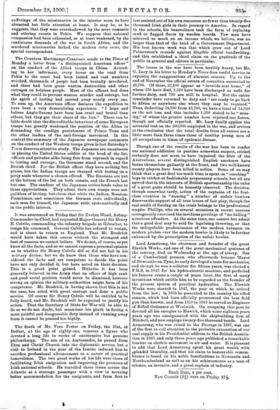Lord Armstrong, the chairman and founder of the great Elawick
Works, and one of the great mechanical geniuses of the century, died on Wednesday at the age of ninety. Son of a Cumberland yeoman who afterwards became Stayor of Newcastle-on-Tyne, he early developed a taste for mechanics, and though he was a solicitor for fifteen years, was elected a F.R.S. in 1843 for his hydro-electric machine, and perfected his famous crane a couple of years later, the first of many inventions which entitle him to be regarded as the founder of the present system of practical hydraulics. The Elswick Works were started in 1847, the year in which he retired from the law ; in 1858 he presented to the country his rifled cannon, which had been officially pronounced the best field gun then known; and from 1859 to 1863 he served as Engineer of Rifled Ordnance at Woolwich. On resigning this post he devoted all his energies to Elswick, which some eighteen years years ago was amalgamated with the shipbuilding firm of Mitchell, and now employs twenty-five thousand hands. Lord Armstrong, who was raised to the Peerage in 1887, was one of the first to call attention to the probable exhaustion of our coal supply in his Presidential address to the British Associa- tion in 1863, and only three years ago published a remarkable treatise on electric movement in air and water. It is pleasant to add that Lord Armstrong spent his great wealth with splendid liberality, and that his claim to honourable remem- brance is based on his noble benefactions to Newcastle and Northumberland as well as on his achievements as a man of science, an inventor, and a great captain of industry.


































 Previous page
Previous page